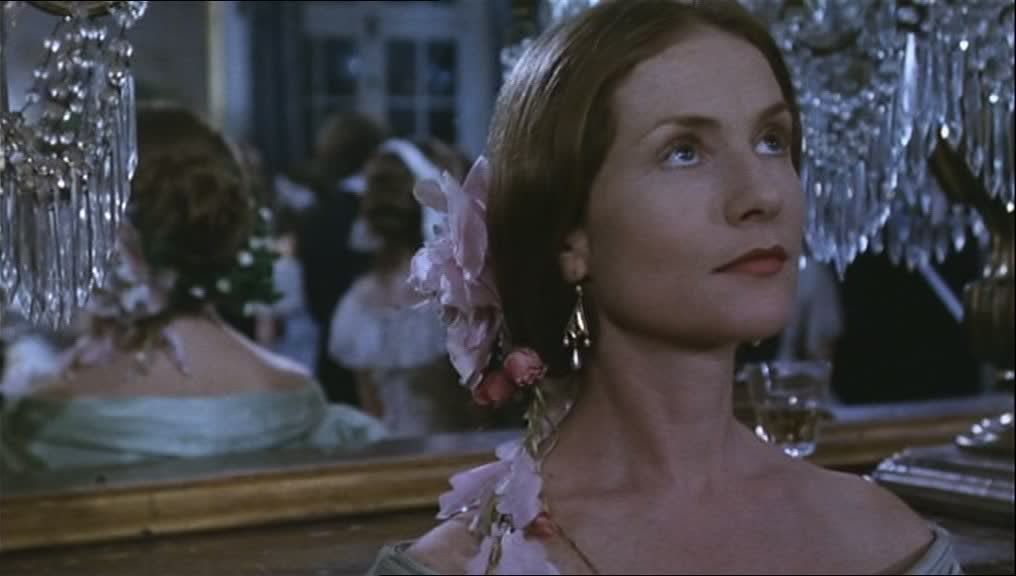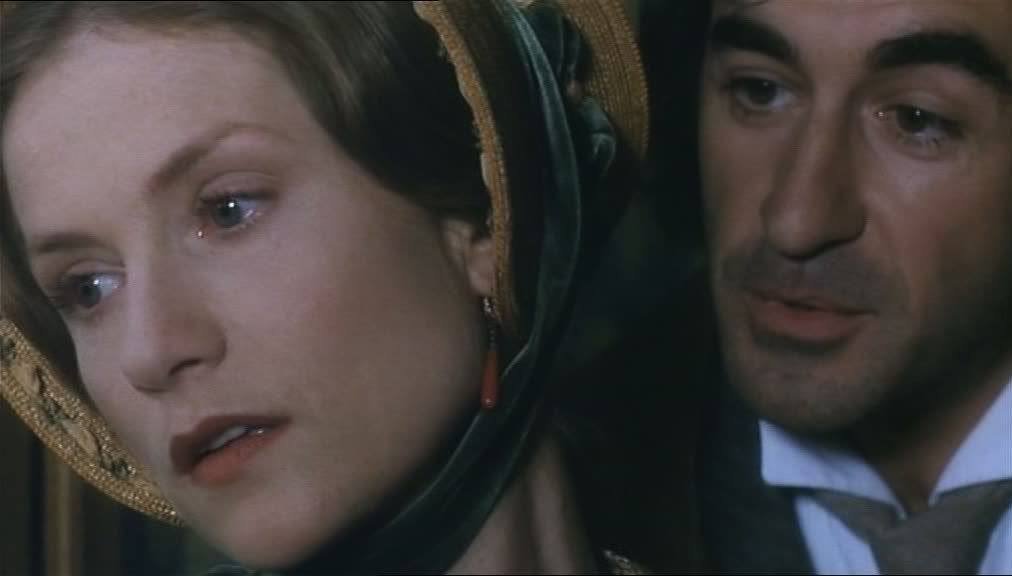
Claude Chabrol is so thoroughly associated with the genre of the thriller that it's always a surprise when he ventures outside its confines. Certainly, Flaubert's novel Madame Bovary is not what one expects of Chabrol; a period piece literary adaptation is very far from the director's familiar territory, even if this novel of a bourgeois woman's boredom and rebellion resonates thematically with Chabrol's usual topics. Chabrol plays it mostly straight, sticking faithfully to the source novel and delivering a dry, somewhat cool costume drama that doesn't really play to the director's strengths.
It's the story of Emma Bovary (Isabelle Huppert), married to the doctor Charles (Jean-François Balmer), who she soon realizes is a total bore, unable to provide her with the glamorous, exciting life that she dreams about. Dissatisfied with this dull marriage and her stultifying life as a homemaker, Emma alternates between periods of passionate affairs and wild spending, and periods of recommitment to the virtues of family and home. She has two torrid affairs, first with the sly playboy Rodolphe (Christophe Malavoy) and then with the sensitive young Leon (Lucas Belvaux), but neither of these loves can ultimately save her from the self-destructive streak that leads her closer and closer to oblivion.
Emma is a romantic who's filled with dreams by the novels she reads as an escape from her dull, passionless husband, whose intellect she finds so wanting. Under the influence of her desire for Leon, she walks around her garden, practicing swooning declarations of love with a theatricality that obviously indicates she's acting out scenes, imagining her own life as a novel, playing herself as a character in a romantic book. She's filled with grand dreams that are very distinct from the unfulfilling life she actually leads. In one of her happiest moments, she and her husband are invited to a fancy ball by a local dignitary, and Emma is so overwhelmed by the glamour and finery on display that she nearly swoons with pleasure, drifting around the hall listening to the stimulating conversations that she'll never have at home with her husband.

Chabrol wittily stages the big seduction scene between Emma and Rodolphe by cutting back and forth between the couple and the agricultural fair going on outside. He alternates between Rodolphe's passionate come-ons to Emma and the awarding of prizes for best manure and best pigs and so on, cleverly subverting the romance of the scene with these earthy rural details. After all, for Rodolphe this is just a game, a conquest, while for Emma it's like a scene out of one of her beloved novels, the fulfillment of her dreams and secret desires — the romance is a sham, stained by baseness. When Emma rides with Rodolphe into the woods and finally gives in to her passions, it's obvious that she's acting, performing a role. She's more excited by the idea of this secret affair than she is by its reality, which is perhaps why Chabrol discreetly cuts away from the actual lovemaking. The real pleasure for Emma is not the actual sex but the romance and melodrama of it; she gets shivers of pleasure by looking in the mirror and saying, "I have a lover," pronouncing it with the wonder of a woman living out her literary fantasy.
Emma is constantly searching for something, though she's not sure what it is, and one institution that the film repeatedly holds up as inconsequential is religion and the church, which offer scant comfort. She goes to see the village priest, but he just talks past her without really hearing her; submerged in the physical problems and poverty of his flock, he's unable, or unwilling, to appreciate the more metaphysical, less tangible problems that Emma wants to tell him about. The frustration of the shot is sublimely realized: while Emma stares straight ahead, her eyes wet, struggling to express her thoughts, the priest prattles on about the problems of his parishioners, oblivious to Emma's troubles — or, perhaps, deliberately stomping over them, trying to shame her out of her misery by pointing out how many worse problems are experienced by people of lower social classes.
The film is generally well-realized and well-acted, and moments like this are staged by Chabrol to maximize the emotional and thematic subtext of Emma's various encounters. The film as a whole, however, doesn't quite connect: it lacks the satirical bite of Chabrol's best work, despite the thematic continuity with his more personal works, and too much of it feels like a scrupulously faithful condensation of the source novel rather than the work of a director applying his own voice to this material.

1 comment:
Chabrol's Madame Bovary is really his collaboration wit Isabelle Huppert.It's a legenadry litary character and she attacks it with all the gusto one would expect. The film as a whole is OK but not inspired, IMO.
In many respects Flaubert is impossile to adapt. He's one of the most forbiddingly intelectual of authors. His characters don't simply inhabit words -- the exemplify ideas.
Post a Comment